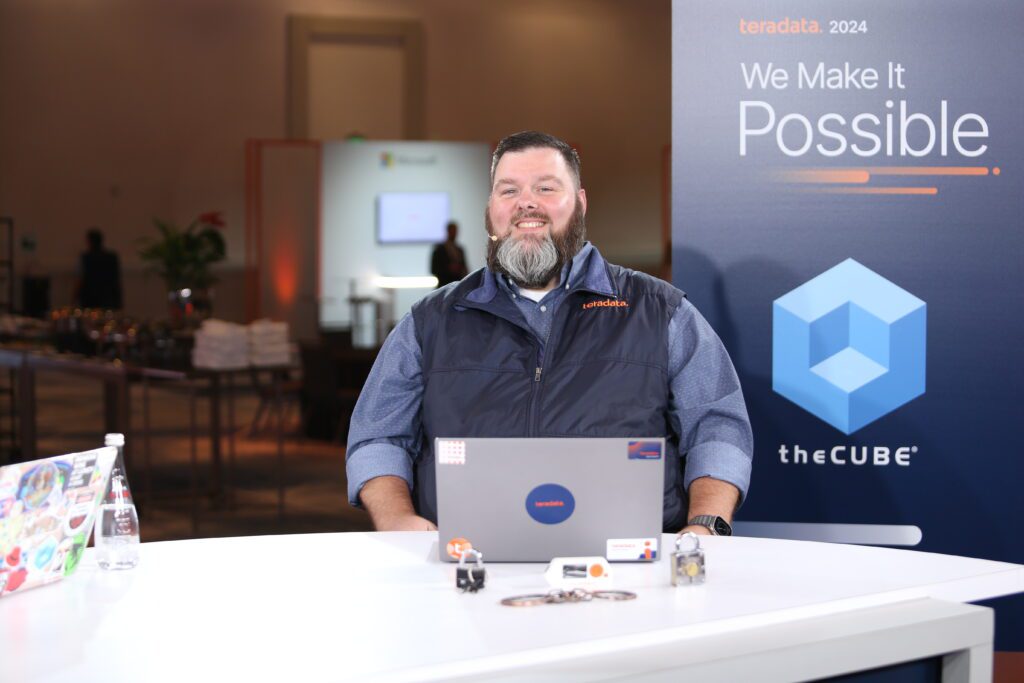As AI becomes increasingly important, the task of prioritizing data security has become clearer in the organization than ever before. However, AI for IT operations introduces new threat vectors for malicious actors to infiltrate networks, steal critical data, and spread ransomware. How can companies handle the delicate task of balancing efficient cloud operations with AI cybersecurity?
Teradata's Billy Spears talks with theCUBE about AI cybersecurity.
“Today we have these cloud products, two great products that customers can choose from,” said Billy Spears (pictured), chief information security officer at Teradata Corp. “And inside of that, we've built things like threat models. That's all the risks behind the scenes. We think about it so you don't have to. Then what we do is take that information and we build things through all kinds of application security testing. We start with testing.” It's open source; we bring it into a stable environment and once we're ready to go into production, we have (a) runtime environment.”
Spears spoke with TheCUBE Research's Rob Strechay and co-host Savannah Peterson on Teradata possible During an exclusive broadcast on theCUBE, SiliconANGLE Media's live streaming studio. They discussed Teradata's blueprint for businesses navigating the complex intersection of cloud computing, artificial intelligence, and regulatory compliance. (*Disclosure below.)
AI Cybersecurity: Overcoming Regulatory and Compliance Challenges
Today's companies face the unique challenge of AI cybersecurity. Malware and worms can infiltrate AI systems in unpredictable and unexpected ways. Spears noted that due to their inherent learning capabilities, AI systems have access to vast amounts of data, making them prime targets for cybercriminals looking to exploit vulnerabilities.
“Nobody knows where the cloud is, but all it takes is the physical infrastructure, and the things you can touch with the virtual infrastructure,” he said. “Maybe your machine is at Microsoft, and it's sunk in the middle of the ocean. What we have in terms of security is (a) purposeful investment in all the major categories. We don't worry about defensive layers, we don't worry about posture. We track data at the scale you want, and we meet Wherever you are, we have options for you.
The world of regulatory compliance is complex. As more organizations move to the cloud, they face stringent security regulations and frameworks, often tailored to specific industries or regions. From the history of payment cards to the Health Insurance Portability and Accountability Act and from the International Organization for Standardization to Security Operations Center certifications, companies must adhere to a wide range of security standards. In cloud environments, these standards become more complex due to the global nature of data transfer. Clients face the heavy burden of managing hundreds, if not thousands, of regulatory compliance controls, according to Spears.
“It's complicated, there are a lot of systems, rules, frameworks… there are many different sets of controls,” he said. “We're talking hundreds if not thousands of controls you have to think about. Internally, you have to manage all of that yourself. In the cloud, we do all the homework for you, which is phenomenal.
For example, the Digital Operational Resilience Code standard is scheduled to go into effect by 2025. It will be one of the most stringent compliance regulations to date, especially for the financial sector. The law mandates cloud recovery capabilities to ensure financial services continue to operate with minimal downtime, adding a new layer of resiliency to cloud infrastructures, according to Spears.
“We know exactly where DORA is, and this is probably the most stringent regulation since we've seen (the General Data Protection Regulation),” he said. “We're really ahead of these things. We've got all these certifications across all of our product lines now, and we're still achieving higher levels.”
Here's the full video interview, part of SiliconANGLE and theCUBE Research's coverage of Teradata possible:
(*Disclosure: TheCUBE is a paid media partner of Teradata Possible. Neither Teradata Corp, a sponsor of theCUBE's event coverage, nor other sponsors have editorial control over content on theCUBE or SiliconANGLE.)
Photo: Silicone Angel
Your upvote is important to us and helps us keep the content free.
One click below supports our mission of providing free, deep, relevant content.
Join our community on YouTube
Join a community of over 15,000 #CubeAlumni experts, including Amazon.com CEO Andy Jassy, Dell Technologies Founder and CEO Michael Dell, Intel CEO Pat Gelsinger, and many more notable figures and experts.
Thank you



